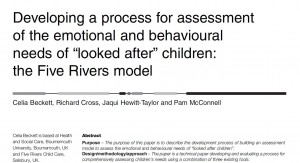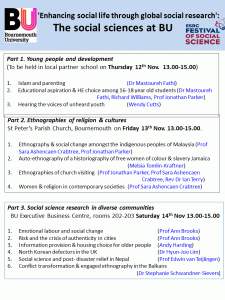All staff and students welcome. Please feel free to bring your lunch.
Voices of the Secret State: Human Rights Activism among North Korean
Defectors in the UK
Abstract: My paper aims to highlight the lived experiences and identity formation of North Korean defectors settled in the UK who are involved in human rights activism. Whilst violations of human rights in North Korea are well documented, human rights activism by its defectors is less well known. Since 2004, approximately 600 North Koreans have settled in the UK. Free NK, a human rights organisation born out of this settlement, has been active in illuminating the reality of North Korea whilst also working towards subverting the regime by informing its fellow remainders about the outside world through the distribution of newspapers. This paper is drawn from ongoing research on North Korean defectors living in the UK. The data is collected using life history interviews to capture their lived experiences and to identify a range of factors which have influenced their involvement in the activism whilst also seeking to find better ways of improving the wellbeing and quality of life for those activists. The presentation will focus on the in-depth story of a North Korean defector who has founded Free NK. Themes that will be addressed in this story include the reason why he has fled North Korea; the processes of getting to the UK; challenges he has faced in his human rights activism.
Dr Hyun-Joo Lim is a lecturer in Sociology and the programme leader for BA Sociology and Social Policy at BU. She is originally from South Korea and has been engaged in various research projects that explore issues around migration, ‘race’/ethnicity, gender and identity. Her previous research examined East Asian mothers in Britain.
For more information about Social Science seminar series please get in touch with Dr Mastoureh Fathi (mfathi@bournemouth.ac.uk).




 This afternoon Prof. Jonathan Parker introduced the final of three session in the Executive Business Centre under the title ‘Enhancing social life through global social research: Part 3. Social science research in diverse communities’. This session was well attended and coveredwas a wide-range of interesting social science research topics.
This afternoon Prof. Jonathan Parker introduced the final of three session in the Executive Business Centre under the title ‘Enhancing social life through global social research: Part 3. Social science research in diverse communities’. This session was well attended and coveredwas a wide-range of interesting social science research topics.

 To cope with the ‘wicked’ nature of problems within adult social care it is important that leaders are able to think beyond usual leadership and management approaches. ‘Wicked problems’ require ‘wicked solutions’, a break with the constraints of the past and an approach which embraces creativity. It requires individuals who can facilitate a collaborative approach to harness creativity across different stakeholders both internal and external to their organisation. It requires a style of leadership which is focused on participation rather than top down direction – that is inclusive, and supports engagement with collective ideas. Such leaders need to work with the resources within their own workforce by adopting ‘the moral resourcefulness’ to engage in challenging conversations (Hutchinson et al. 2015:3022). Only collective engagement within and across organisations can hope to address the ‘wicked problems’.
To cope with the ‘wicked’ nature of problems within adult social care it is important that leaders are able to think beyond usual leadership and management approaches. ‘Wicked problems’ require ‘wicked solutions’, a break with the constraints of the past and an approach which embraces creativity. It requires individuals who can facilitate a collaborative approach to harness creativity across different stakeholders both internal and external to their organisation. It requires a style of leadership which is focused on participation rather than top down direction – that is inclusive, and supports engagement with collective ideas. Such leaders need to work with the resources within their own workforce by adopting ‘the moral resourcefulness’ to engage in challenging conversations (Hutchinson et al. 2015:3022). Only collective engagement within and across organisations can hope to address the ‘wicked problems’.











 Fourth INRC Symposium: From Clinical Applications to Neuro-Inspired Computation
Fourth INRC Symposium: From Clinical Applications to Neuro-Inspired Computation Writing policy briefs
Writing policy briefs Upholding Excellence: The Concordat to Support Research Integrity
Upholding Excellence: The Concordat to Support Research Integrity Today’s Documentation Will Serve Tomorrow’s Justice
Today’s Documentation Will Serve Tomorrow’s Justice ECR Funding Open Call: Research Culture & Community Grant – Application Deadline Friday 12 December
ECR Funding Open Call: Research Culture & Community Grant – Application Deadline Friday 12 December MSCA Postdoctoral Fellowships 2025 Call
MSCA Postdoctoral Fellowships 2025 Call ERC Advanced Grant 2025 Webinar
ERC Advanced Grant 2025 Webinar Horizon Europe Work Programme 2025 Published
Horizon Europe Work Programme 2025 Published Horizon Europe 2025 Work Programme pre-Published
Horizon Europe 2025 Work Programme pre-Published Update on UKRO services
Update on UKRO services European research project exploring use of ‘virtual twins’ to better manage metabolic associated fatty liver disease
European research project exploring use of ‘virtual twins’ to better manage metabolic associated fatty liver disease